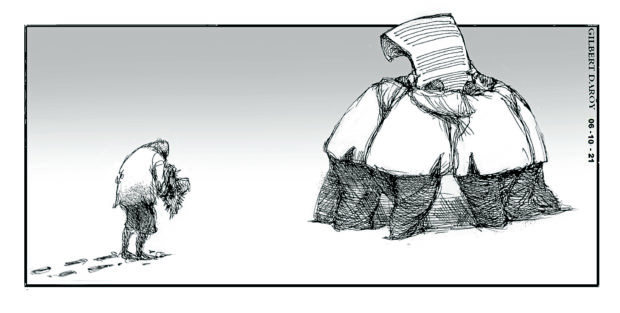Left out yet again

Editorial cartoon
The controversial coco levy fund was born out of a scam perpetrated during the Marcos dictatorship. That long-festering injustice was supposed to be resolved with the passage of the Coconut Farmers and Industry Trust Act in February this year.
Farmers’ groups fear, however, that yet another rip-off is in the making as the draft implementing rules and regulations (IRR) of Republic Act No. 11524 that took effect in March have left out the coconut farmers from the crucial discussions on how the consolidated coconut levy collections of at least P76 billion will be used.
In the proposed IRR, the management of the trust fund will be left to the Trust Fund Management Committee composed of the Departments of Finance, Budget and Management, and Justice. The Committee will have the power to, among others, privatize or dispose of the coco levy assets, and set investment priorities and trust fund management expenses.
Once again left out and shunted aside are the beneficial owners of the coconut levy funds, which the Supreme Court declared in its 2012 decision as “held in trust by the government for the exclusive benefit of the coconut farmers and the industry.”
“Provisions on the privatization of coco levy assets should be subject to democratic consultation with farmers,” protested Omi Royandoyan, convenor of Centro Saka. “We strongly recommend the participation of farmers in handling and managing the trust fund.”
The Federation of Free Farmers, Confederation of Coconut Farmers Organizations of the Philippines (Confed), and KILUS Magniniyog Organizations of the Philippines likewise called out the seemingly “undue haste” in the issuance of the IRR, which will come in the form of a joint circular from the three departments.
“For desperately poor producers, will genuine public hearings and consultations on the fund’s implementing rules be undertaken? How will the Executive satisfy the demand for public transparency and protecting the interests of the Fund’s beneficial owners—the country’s 3.5 million coconut farmers and farm workers?” the groups asked.
Among their key concerns is the lack of report on the trust fund interest earnings since 2015 from the P69.5 billion in proceeds from the sale of the San Miguel Corp. preferred shares that had appreciated to P76 billion. From 2015, the groups contend, there has been no accounting of interest earned, and the lack of transparency is feared to extend to the handling of the trust fund under the new law.
The farmers’ groups are proposing that to ensure transparency and accountability, the DOF as fund manager and the Bureau of the Treasury as fund custodian should regularly provide a fund status report showing the movements of the fund, the fund balance, proceeds of monetization of the levy assets, disbursement and earnings of the fund, etc. They also called for the formation of a farmers’ consultative group, composed of members of recognized national organizations of small coconut farmers, to have a say in the overall management of the trust fund. “The trust fund committee owes it to us to make us understand and inform us how the coco levy fund and assets are being disposed and going to be disposed,” said Confed executive director Charlie Avila.
That the coconut farmers are still being made to endure an agonizing wait for their rightful due represents another broken campaign promise by President Duterte. In March 2016, then candidate Rodrigo Duterte vowed to return the coco levy fund to the farmers “sa lalong madaling panahon.” With barely a year left in his term, that has yet to happen.
Many coconut farmers may also have been left out of the registry of fund beneficiaries, prompting senators Risa Hontiveros and Francis Pangilinan to file a resolution seeking a Senate inquiry into the status of the registration of the country’s coconut farmers. The Philippine Coconut Authority (PCA) is mandated to complete the registry within 90 days from RA 11524’s effectivity or until June 11 this year; PCA data show 2.5 million coconut farmers and farm workers registered under its system, which is one million less than the Philippine Statistics Authority’s estimate of 3.5 million coconut farmers and workers nationwide.
Coco farmers remain among the country’s poorest citizens, earning an estimated P1,500 a month, while the coconut industry itself is an “orphan” in the country’s agricultural sector due to poor investments, according to a 2020 paper by the Congressional Policy and Budget Research Department of the House of Representatives. Instead of being further burdened and marginalized, coconut farmers and farm workers should be reaping at last the benefits of the levy fund that had been extracted from their toil and sacrifices. Just as crucially, they must be given a hand in the running of the fund under their name. They cannot be made to wait some more.




















